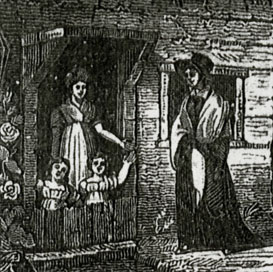Study Guide Social Hierarchies

Table of Contents
Hospitality
Mayhew often comments cheerfully on the hospitality of the Wampanoag converts as if their conversion were the source of this virtue; however, hospitality was a key element of Algonquian society. Hospitality was one aspect of reciprocity that was often misinterpreted by the colonists. While for Algonquians giving hospitality conferred status on both the giver and receiver, English colonists often understood Algonquians' hospitality as conferring status on the receiver alone. Consequently when Indian minister John Neesnummin visited Samuel Sewall in Boston in 1708, Sewall could find no-one willing to lodge Neesnummin. Similar treatment of a visiting white minister would have been unthinkable: hosting a white minister increased one’s status as in general ministers were perceived as closer to God and hence higher in the Puritan church hierarchy. It appears, however, that colonists not only feared the “contagion” of housing an Indian, but they also feared the lowered status that would accompany hosting such an apparently undistinguished guest. Even the boarding houses refused to lodge Neesnummin, and Sewall was finally forced to lodge the minister in his own study (Kawashima 108; Sewall 2.212-13).
 Although "Honour reputation [were] attached to good lordship, generosity, and the appearance of an open household," the area in which Puritans received outsiders reflected the relative social ranks of visitor and visited (Heal 13, 16). The further one was received from the home emphasized the guest's degree of "otherness" (Heal 16). For example, one could be either allowed into the inner chambers, the receiving rooms, met at the door, or stopped at the gate. Thus, the tradition of excluding Algonquians from Puritan towns was an assertion both of perceived Algonquian "inferiority" and English settlers' desire for difference and distance. This "distance" was also maintained on the Puritan part in the form of rules against miscegenation. Since marriages between Algonquian communities were a chief means of forging and reinforcing alliances, such prohibitions were probably (rightly) perceived by Algonquians as a form of insult, or at least a lack of desire to be truly allied.
Although "Honour reputation [were] attached to good lordship, generosity, and the appearance of an open household," the area in which Puritans received outsiders reflected the relative social ranks of visitor and visited (Heal 13, 16). The further one was received from the home emphasized the guest's degree of "otherness" (Heal 16). For example, one could be either allowed into the inner chambers, the receiving rooms, met at the door, or stopped at the gate. Thus, the tradition of excluding Algonquians from Puritan towns was an assertion both of perceived Algonquian "inferiority" and English settlers' desire for difference and distance. This "distance" was also maintained on the Puritan part in the form of rules against miscegenation. Since marriages between Algonquian communities were a chief means of forging and reinforcing alliances, such prohibitions were probably (rightly) perceived by Algonquians as a form of insult, or at least a lack of desire to be truly allied.
Hospitality was essential for the proper functioning of both English and Wampanoag society. As Peter Hulme notes, in reciprocal societies hospitality is essential since it serves to "dissolve the category of stranger, resolving it either into alliance or hostility" (Hulme 148). For Wampanoags hospitality established and cemented relationships and empowered both the giver and the receiver (Hamell 67-68). In accepting the gift of hospitality, the guest attested to the Wampanoag host’s prestige and generosity (Marten 20). Yet throughout early travel writings, English colonists often use Algonquian hospitality to reinforce English superiority. Hospitality is used as a sign to assure English readers that the Algonquians accept their role within the English system and that they fulfill it out of love, rather than mere obligation. In William Wood's words, their action show "more love than compliment" (Wood 89). The simultaneous acceptance of Algonquian hospitality and rejection of Algonquian guests points to a communication breach, as well as a place where English accounts tend to be unreliable since they have (willfully?) "misread" the signs. In this context, it is interesting to note how Experience Mayhew treats Wampanoag hospitality and what it signifies for both him and his audience.
Gift Exchange < Previous | Next > Magistrates & Guardians